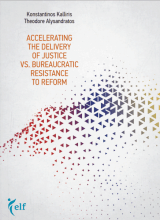The timely and efficient administration of justice is a fundamental aspect of the rule of law and an essential component of any liberal democracy. Delays in the justice system are not uncommon among several EU countries (including Greece), undermining public trust in the rule of law and, through inadequate contract enforcement, economic freedom. Courageous reforms are often needed in order to tackle this important problem, including the introduction of new legislation. This study collected and analysed data (including original data) from two recent reforms in the Greek Criminal Justice System. The first reform was an effort to improve the structure and efficiency of Greek courts and reduce delays. The aim of the second reform was to tackle prison overpopulation by allowing earlier release on parole. More specifically, we compare judgements from both single and three-member courts to examine whether the introduction of the former is an economical and efficient way to address the well-known delays in the Greek Justice System; and whether judges endorse government-initiated reforms or pursue their own independent principles and goals in ways that may cancel out the reform in practice. Our findings suggest that there is room for optimism and a clear need for more studies of this nature.
Authors: Konstantinos Kalliris, Theodore Alysandratos
Organisation: KEFiM
Year: 2017
